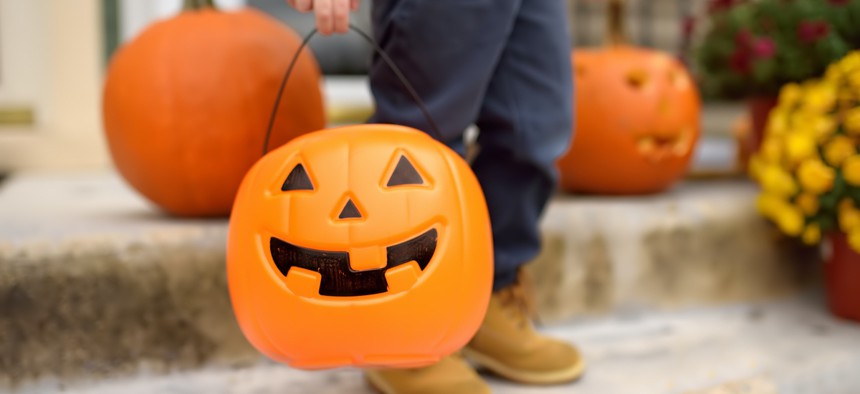'Grab and Go' Treats and Other Strategies Cities Are Suggesting to Save Halloween

Most municipalities don't regulate Halloween and declined to start doing so this year, though many recommended extra safeguards for families who choose to go door to door. Shutterstock
Trick-or-treating is still happening, but with new restrictions or guidance, and most cities have canceled Halloween parades, festivals and haunted houses.
With three weeks before Halloween, the ongoing coronavirus pandemic has already scared off a host of spooky celebrations across the country.
Gatherings with non-household members, including parties, carnivals and haunted houses, are cancelled in Los Angeles County, where the department of public health also recommends that residents refrain from trick-or-treating due to the difficulty of maintaining “proper social distancing on porches and at front doors.” New York City cancelled its annual Halloween parade, and city-sponsored trick-or-treat events were called off in dozens of cities across the country, from Denver to Oskaloosa, Iowa to Dover, Delaware.
And while most cities haven’t outright banned door-to-door candy canvassing, most are strongly discouraging it, based largely on public health guidelines issued by the Centers for Disease Control and Prevention. Those recommendations, released last month, categorize traditional seasonal activities according to risk, with nearly every Halloween mainstay—like costume parties, trick-or-treating and haunted houses—presenting the greatest likelihood of spreading the virus.
“Fall and winter celebrations...typically include large gatherings of families and friends, crowded parties and travel that may put people at increased risk for Covid-19,” the agency said in a statement. “Many traditional Halloween activities can be high-risk for spreading viruses. There are several safer, alternative ways to participate in Halloween.”
Generally, those are outdoor activities limited to members of the same household, including carving pumpkins, decorating your living space and holding a virtual Halloween contest.
Still, most cities have declined to prohibit neighborhood trick-or-treating. Most municipalities don’t officially regulate Halloween and leaders are loath to begin now, though many have either discouraged the practice or issued tips to make it safer. In Dayton, Ohio, for example, the public health department recommends that trick-or-treaters go door-to-door “only with members of your own household,” incorporate a cloth face mask into their costumes and “lessen your typical route” by visiting fewer houses than normal.
In Colorado, health officials recommended that parents assess the severity of the pandemic in their county using the state’s Covid-19 dial and then select appropriate activities based on the risk level. As of Friday, most counties were designated “Safer Level 1,” which would permit small get-togethers (“ideally outdoors”) with a maximum of 25 guests, although Denver County—the state's most populous—was in "Safer Level 2," which limits gatherings to 10 people.
“Halloween 2020 will be unlike any other in recent history," Robert McDonald, the city’s public health administrator, said in a statement. “We’re dealing with a global pandemic. And for most of us, it means uncertain times. But if we are careful, if we maintain proper social distancing, if we wear our face coverings and use sanitizer, we can maintain a little bit of our traditions and enjoy a fun evening with loved ones.”
In Massachusetts, multiple towns banned “traditional trick-or-treating,” but many said it was acceptable for households “to prepare individually wrapped goodie bags and to place them in the yard or driveway for easy grab-and-go,” according to a local NBC affiliate. In Georgia, cities largely left the decision to parents and homeowners associations, but encouraged residents to heed state and local health guidelines during their celebrations.
“Historically, Dunwoody has not regulated Halloween, and we’re not going to start this year,” Lynn Deutsch, the city’s mayor, told Reporter Newspapers. “I’m confident that families can find a way to trick-or-treat safely.”
Other cities worked to adapt long-standing Halloween events to the pandemic. In Carson City, Nevada, parks officials turned an annual BOOnanza trick-or-treating event into a drive-through, encouraging families to decorate their cars to “add to the festivities.” In Takoma Park, Maryland, officials planned a roster of pandemic-safe activities, including a “decorate your dwelling” contest and a Halloween “walk-thru,” where small groups of residents and businesses hand out candy at designated spots throughout the town.
And Halloween revelers can still wear masks, according to federal guidance—but perhaps not the type they’d prefer. A costume mask, the CDC cautioned, should not be used “as a substitute for a cloth mask unless it is made of two or more layers of breathable fabric that covers your mouth and doesn’t leave gaps around your face.” Likewise, the agency said, costume masks shouldn’t be worn over cloth masks “because it can be dangerous if the costume mask makes it hard to breathe. Instead, consider using a Halloween-themed cloth mask.”
In New Jersey, Gov. Phil Murphy put the rule in more colorful—and holiday-appropriate—terms.
“Wear a mask that covers the nose and mouth," he said at a news conference Monday. "A Jabba the Hutt mask is not a substitute … You may wish to dress as a knucklehead, but we don't want anyone to act like one."
Kate Elizabeth Queram is a staff correspondent at Route Fifty and is based in Washington, D.C.
NEXT STORY: Schools Aren’t Super-Spreaders





